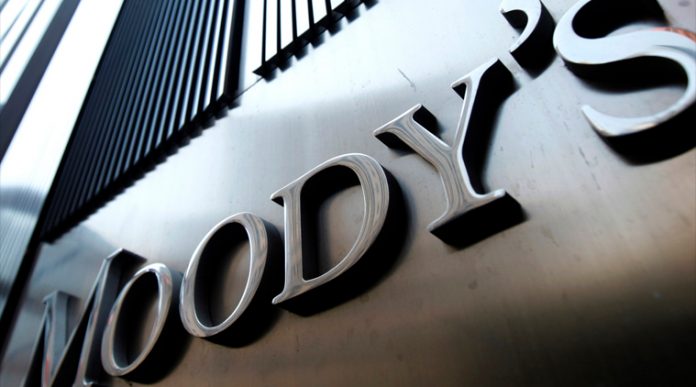ISLAMABAD: Pakistan’s credit profile (B3 stable) is supported by its strong growth performance and potential, a relatively large – though low-income – economy, and an improved track record of reforms that started under the 2013-16 International Monetary Fund (IMF) programme, Moody’s maintained in the latest report released on Friday.
Moody’s credit analysis as of May 18, 2018, highlighted the greater transparency, which Pakistan has achieved in its economic field, besides keeping inflationary pressure to low levels while investing heavily in the energy and infrastructure sectors under the China Pakistan Economic Corridor (CPEC).
Moody’s noted that the stable outlook reflects Pakistan’s potential to further strengthen its growth beyond current levels with successful implementation of CPEC projects, cashing in on both foreign and domestic investments, continued robust activity of large-scale manufacturing and a rebounding agriculture sector all of which would aid Pakistan to shift to a higher growth trajectory on sustained basis.
“Pakistan’s GDP growth has accelerated following the launch of CPEC with China (A1 stable) in 2015 and the successful completion of its three-year Extended Fund Facility program with the IMF in September 2016,” the report read.
Moody’s in its report also highlighted the size of Pakistan’s economy, with a nominal gross domestic product (GDP) of $305 billion in the fiscal 2017 – the third largest among sovereigns within the same category – which affords the country resilience to local and external shocks.
It however reassured that Pakistan boasts better GDP growth among its peers with 5.8 per cent growth in fiscal 2018, as compared to the median 2017 growth of 3.8 per cent among B rated sovereigns.
“Growth drivers include the continuing recovery in the agricultural sector, aided by an increase in credit disbursements and more favorable weather conditions, robust activity in large-scale manufacturing because of improved energy availability and capacity expansions associated with CPEC, and higher remittance inflows, which rose 3.9 per cent in the first ten months of fiscal 2018 compared with the same period of 2017, after having contracted in fiscal 2017,” the report added. With the growth drivers largely intact, Moody’s in the reported highlighted that it expects GDP growth to remain around similar levels in fiscal 2019, at 5.6 per cent.
The report also noted that contribution of industrial sector activity to growth has also rebounded since declining back in 2011-13.
Institutional Strength
Moody’s ranked Pakistan’s institutional strength at “Very Low (+)”, above the indicative score of “Very Low (-)”, with Bangladesh, Belarus (B3 stable), and Uganda (B2 stable) in the same league. According to Moody’s this score reflects the country’s performance under the 2013-16 IMF programme, which has contributed to greater central bank autonomy and stronger prospects for monetary policy credibility and effectiveness.
Nonetheless, since the completion of the programme and ahead of general elections expected in July 2018, reforms progress has slowed, Moody’s noted. Overall assessment also reflects Pakistan’s low rankings on the Worldwide Governance Indicators (WGI) and institutional constraints that limit fiscal and structural reforms.
It highlighted, “The very low level of real GDP per capita of around $5,000 on a purchasing price parity (PPP) basis ranks within the bottom 15th percentile of our rated sovereigns, which constrains the country’s credit profile relative to peers.”
Moody’s added that weak global competitiveness weighs down on Pakistan’s economic strength. In the 2017-18 World Economic Forum Global Competitiveness Report, Pakistan ranked 115 out of 138 countries, a slight improvement from the 122 ranking the year before but still below many regional and similarly rated peers while ranking sixth lowest among Moody’s rated sovereigns.
Low scores in infrastructure, institutions, and health and primary education continue to weigh on Pakistan’s ranking. This is corroborated by the country’s World Bank Doing Business ranking of 147 out of 190 countries, which reflects particularly weak scores in “getting electricity”, “trading across borders”, and “paying taxes”, Moody’s highlighted.
Future Outlook and Challenges
According to Moody’s, credit challenges include Pakistan’s “high general government debt burden and low debt affordability, weak physical and social infrastructure weighing on economic competitiveness, an increasingly vulnerable external payments position, and high political risk”.
The moderate but rising level of external government debt also exposes the country’s finances to sharp currency depreciation. In addition, the high level of imports — largely because of CPEC — continues to exert pressure on the external account, it added.
Meanwhile, Moody’s expects fiscal deficit to remain around 5.5 per cent of GDP in fiscal 2018 on the back of strong revenue collection in the first six months, which witnessed a 20 per cent rise as compared to the corresponding year-earlier period.
In its report, Moody’s cautioned that triggers for a downgrade include a stalling of the government’s post-IMF programme economic reform agenda, material widening of the fiscal deficit, worsening of the external payments position, loss of multilateral/bilateral support, or renewed political instability.
Some areas where the country requires renewing its focus are increasing the revenue base, investing in social sectors, improving competitiveness, reinvigorating privatisation and managing debt profile astutely.
The future outlook, however, bodes well for Pakistan as the reform agenda continues and key targets of macroeconomic stability, fiscal discipline and growth supporting initiatives continue on track.
Moody’s expects the country to maintain the growth momentum in the next fiscal year also.
Meanwhile, the Finance Ministry, in a statement Monday, said the government welcomed the re-affirmation of Pakistan’s sovereign rating by Moody’s Investors Service.
It showed that Pakistan’s economy, despite challenges, was on a stable path to a higher growth trajectory, the statement added.























